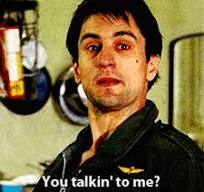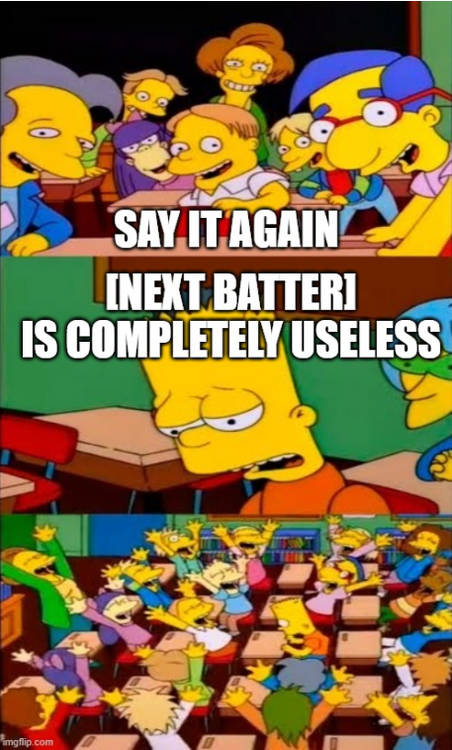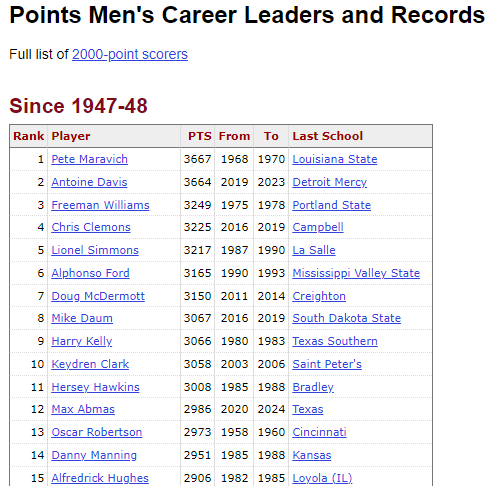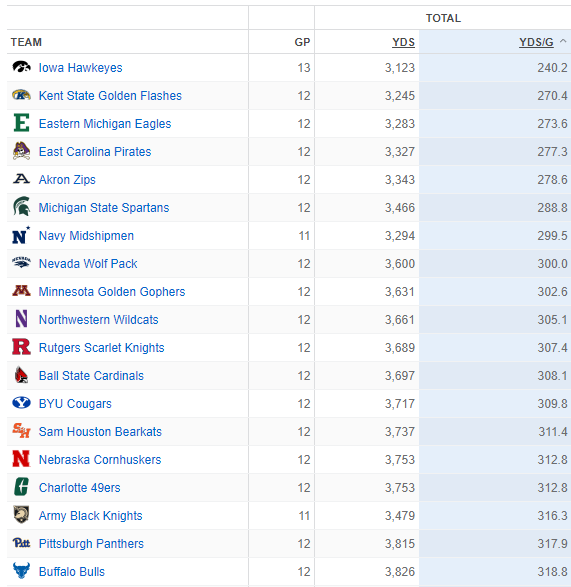Everything posted by ryskey
-
2024 Presidential Election Thread - Let's keep the party going.
-
Schlossed and confused: When panic leads to an Earley hire
- Schlossed and confused: When panic leads to an Earley hire
Yes, greatest athletic dynasty since indo-european hunter gatherers Bok and Norg dominated at Throw Heavy Thing- Schlossed and confused: When panic leads to an Earley hire
Ya he's faded a bit lately. We are 200 posts in and no one is even close to mentioning Hitler- You say you want a revolution...Congo style
Congo number one exporter of coltan, all other countries have inferior coltan- Kansas @ Texas Series Thread
- 2024 Texas Baseball
Probably been beaten to death but I don't want to read back several pages. To find a team with a Q4 record this bad, you have to go down to #68 South Alabama. Past that, it's #109 Michigan State. To find a team with a Q1 record this good, you have to go up to #19 Duke. Past that, it's #13 OU, or #5 Tennessee. Actually, the only team in college baseball with a materially better Q1 record is #2 Kentucky (19-6). No one else is more than a few games above .500. Sounds about right, borderline top 10 or dogshit depending on the day.- Texas @University of Central Florida Series Thread
- Texas @ Houston Series Thread
- Texas @ Kansas State Series Thread
- Texas (-2.5) vs Colorado State- Thursday at 5:50 on TNT
- Texas (-2.5) vs Colorado State- Thursday at 5:50 on TNT
- Texas Basketball 2023-24
Probably missed the discussion on this. But Abmas just passed Oscar Robertson for #12 on the all time scoring list. 3-11 are only separated by 240 points. Assuming postseason games are included (I think they are), there are a minimum of 9 and a maximum of 13-ish games left on the schedule, assuming they make it 3 games into the Big 12 tourney and 3 games into the NCAAs. So assuming he keeps his average of 18ppg, that will leave him somewhere between #8 and #4 on the all time scoring list. Should be able to make #8 by the end of conference play.- 2024 Amari Niblack TE Transfer
- Maybe we need an Argentina thread too
There's a strong national identity that will keep Argentina more or less functional in the midst of any political instability. They expect it and shrug it better than they probably should. Just bring US dollars. There's property crime but no worse than most major American cities. Violent crime also similar to US average.- Maybe we need an Argentina thread too
I think this is the power of labels. At the beginning of that Davos speech, his description of libertarianism sounds almost identical to the Federalist Papers. I think a lot of disgust with Libertarians in the US (including from me) is the propensity to hide behind Hamiltonian descriptions of society while they're trying to justify their right to marry a 7 year old. Or other vile shit. Then there are the MAGA folks who use a Libertarian wrapper to help their twitter following by making them seem edgelord-y, like oooohhh you're such an independent thinker, when in reality it's just an expedient ideology to hide sociopathic selfishness. Anyway, maybe you're right and Millei devolves into that. We'll see.- Maybe we need an Argentina thread too
He's more articulate and consistent (at least so far in these very early days) than other right wing leaders, whether that comparison is made to the present day or the last century in South America. The wave of privatization and de-regulation is the opposite direction of authoritarianism, unless there's a Putin-esque quid pro quo with the aristocracy/oligarchy. If he ramps of the nationalist populism and liberal use of the military, then maybe the comparisons to Pinochet won't be inaccurate. Argentina is racially and ethnically homogenous, with a very small indigenous minority, and Afro-Argentine descendants of slaves are also a tiny minority. So the left/right divide is seen less along racial lines, which makes this less of a social experiment and more of an economic one, at least as much as those can be disentangled. In other words, the oppressed/oppressor dichotomy is much more difficult to define and frame as a political movement in Argentina. No one can even agree whether Peronism, the dominant faction in Argentine politics for the last 80 years, is left or right wing, and I think that's what makes it kind of confusing for people observing Argentina right now. Either way, it was time to move on from the Peronistas. That had become an incoherent mishmash of left/right populism, corporatism, and corruption. Argentina has needed a political enema for decades. I don't know if this is going to work, or if they're going to end up worse off than before, but something needed to be shaken loose. That's going to come with a lot near-term volatility as markets evolve. But I am interested to see what happens with this experiment.- Quinn "La Joya" Ewers - The Man The Myth The Mullet, Now Starting for the Miami Dolphins
Quinn + Arch on the field at the same time. 10 yards minimum- Nick Saban Retirement + Alabama Corch Search Megathread - Deals with Satan Do Expire
- ESPN way too early top 25
- Alamo Bowl - Arizona vs Oklahoma
So painful watching Arnold drop back over and over again and hop around in a perfect pocket for 8 seconds then scramble and throw an incomplete pass accompanied by a hold.- Week 14, 2023, Texas v Washington, College Football Playoff Edition
stfu carpetbagger. Huskies aren't even indigenous to the east coast- Week 14, 2023, Texas v Washington, College Football Playoff Edition
Like we would even care about the opinion of someone who went to school in our nation's capital- Iowa - Glorying In the Nepotism of the Ferentz Family
Their average score of 10 conference games was 13.1-13.5, and yet they went 7-3 in those games. Dead last in offensive yards per game, and 2nd worst is a full 30 yards per game better. Big 10 had the 6 of the bottom 15 offenses in the country. MAC had 3 of the bottom 5 and 4 of the bottom 15 offenses in the country. Combined, the Big 10 and MAC had 2/3rds of the bottom 15 offenses in the country. What is wrong with the Midwest? What is happening? Why is this is so morbidly fascinating? I couldn't watch more than 15 minutes of Michigan-Iowa because it was like I was in a Stanley Kubrick movie.- THE College Football Playoff Rankings Thread [MICH,WASH,TEX,ALA]
I don't know, there's lots of complaining and gnashing of teeth when then NCAA basketball tourney bracket is released. Nothing's perfect, and much prefer that method to determining a champion. You get a tough matchup in the first round and lose, tough, you weren't going to win it anyway. If there were ever a year for 12 teams though, this is it. Byes Michigan, Washington, UT, Alabama First round matchups: 5 vs 12: FSU vs Liberty, the "throw FSU a bone" bowl 6 vs 11: UGA vs Penn St, committee probably adjusts one or the other to prevent conference opponents from facing each other 7 vs 10: Ohio St vs Ole Miss, see above 8 vs 9: Oregon vs Mizzou OU bumped by Liberty lol. Though FSU vs OU would be entertaining. Then you get 2nd round games of (assuming higher seeds win): Michigan vs Oregon Washington vs Ohio St Texas vs Georgia Alabama vs FSU Did I get that right? If so, this would be badass. That's a month of awesomeness right there. - Schlossed and confused: When panic leads to an Earley hire
Football ...
Basketball ...
Baseball ...
Other Sports ...
Futbol ...
🤫995🤫 ...
Gambling ...
Movies & TV ...
Music ...
Hobbies ...
Lulz ...
Food & Travel
...
Daily Texan ...
Business & Markets ...
Cloak Room ...
Help ...
For Sale ...
Board Discussion ...
Advertise...
Tailgate Donations
Back to top











